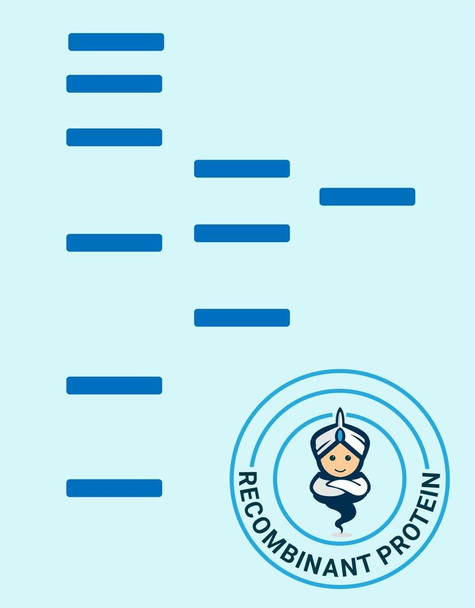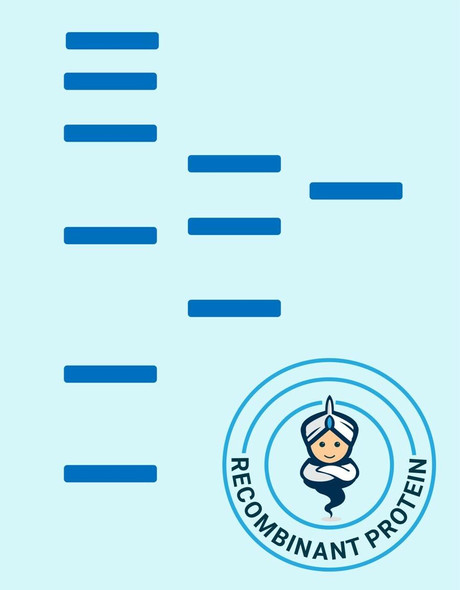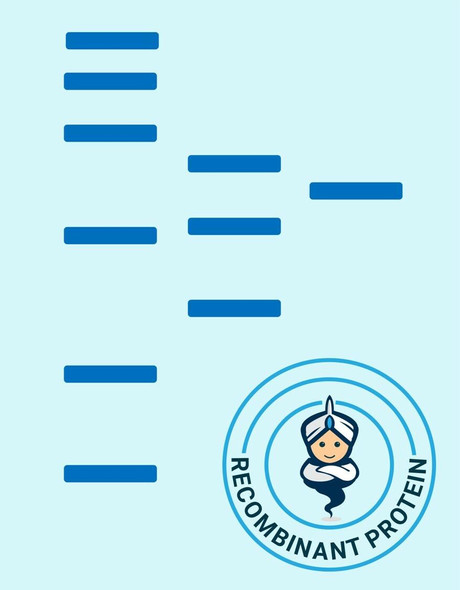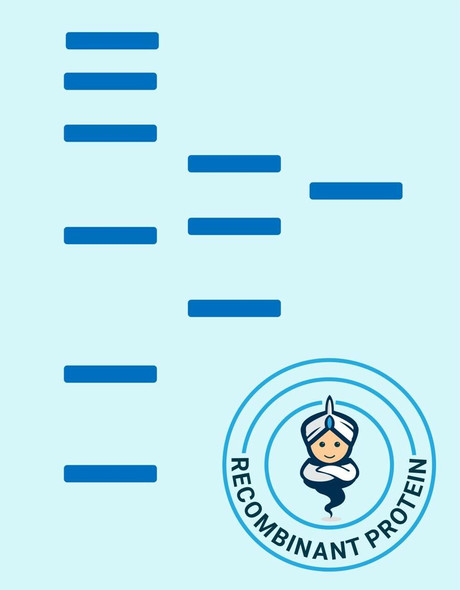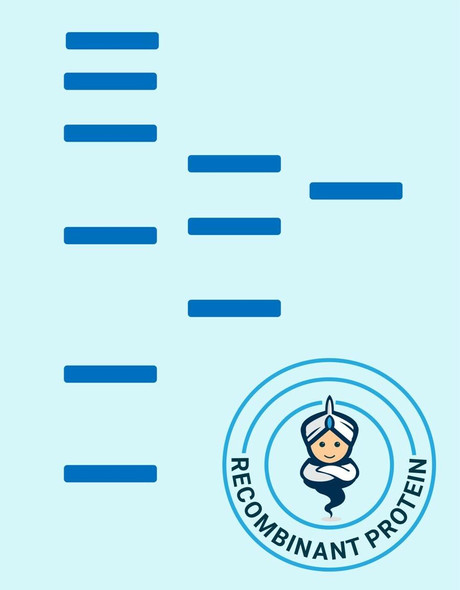Human UBE2C Recombinant Protein (RPPB2367)
- SKU:
- RPPB2367
- Product Type:
- Recombinant Protein
- Species:
- Human
- Uniprot:
- O00762
- Research Area:
- Enzymes
Description
| Product Name: | Human UBE2C Recombinant Protein |
| Product Code: | RPPB2367 |
| Size: | 20µg |
| Species: | Human |
| Target: | UBE2C |
| Synonyms: | Ubiquitin-conjugating enzyme E2 C, EC 6.3.2.19, Ubiquitin-protein ligase C, Ubiquitin carrier protein C, Ubc10, UBCH10, dJ447F3.2. |
| Source: | Escherichia Coli |
| Physical Appearance: | Sterile Filtered clear solution. |
| Formulation: | UBE2C protein 1mg/ml is supplied in 20mM Tris-HCL, pH-8, 0.15M NaCl, 1mM DTT and 10% Glycerol. |
| Stability: | Store at 4°C if entire vial will be used within 2-4 weeks. Store, frozen at -20°C for longer periods of time. For long term storage it is recommended to add a carrier protein (0.1% HSA or BSA).Avoid multiple freeze-thaw cycles. |
| Purity: | Greater than 90.0% as determined by Analysis by SDS-PAGE. |
| Amino Acid Sequence: | MGSSHHHHHH SSGLVPRGSH MGSMASQNRD PAATSVAAAR KGAEPSGGAA RGPVGKRLQQ ELMTLMMSGD KGISAFPESD NLFKWVGTIH GAAGTVYEDL RYKLSLEFPS GYPYNAPTVK FLTPCYHPNV DTQGNICLDI LKEKWSALYD VRTILLSIQS LLGEPNIDSP LNTHAAELWK NPTAFKKYLQ ETYSKQVTSQ EP |
UbcH10 is an essential mediator of mitotic destruction events and cell cycle progression. It catalyzes the destruction of cyclins A and B in conjunction with the anaphase-promoting complex, and therefore, plays an important role in the control of the cell exit from mitosis This activity is essential at then end of mitosis for the inactivation of their partner kinase Cdc2 and exit from mitosis into G1 of the next cell cycle. In addition, UbcH10 bears homology to yeast PAS2, a gene that is essential for biogenesis of peroxisomes. UbcH10 is useful for in vitro ubiquitinylation reactions.
UBE2C Human Recombinant produced in E.coli is a single, non-glycosylated polypeptide chain containing 202 amino acids (1-179) and having a molecular mass of 22.1 kDa.The UBE2C is fused to a 23 amino acid His-Tag at N-terminus and purified by proprietary chromatographic techniques.
| UniProt Protein Function: | UBE2C: Accepts ubiquitin from the E1 complex and catalyzes its covalent attachment to other proteins. In vitro catalyzes 'Lys- 11'- and 'Lys-48'-linked polyubiquitination. Acts as an essential factor of the anaphase promoting complex/cyclosome (APC/C), a cell cycle-regulated ubiquitin ligase that controls progression through mitosis. Acts by initiating 'Lys-11'-linked polyubiquitin chains on APC/C substrates, leading to the degradation of APC/C substrates by the proteasome and promoting mitotic exit. Belongs to the ubiquitin-conjugating enzyme family. |
| UniProt Protein Details: | Protein type:Ligase; Cell cycle regulation; Ubiquitin conjugating system; Ubiquitin ligase; EC 6.3.2.19 Chromosomal Location of Human Ortholog: 20q13.12 Cellular Component: anaphase-promoting complex; cytoplasm; cytosol; nucleoplasm Molecular Function:protein binding; ubiquitin protein ligase binding; ubiquitin-protein ligase activity Biological Process: anaphase-promoting complex-dependent proteasomal ubiquitin-dependent protein catabolic process; cyclin catabolic process; exit from mitosis; negative regulation of ubiquitin-protein ligase activity during mitotic cell cycle; positive regulation of exit from mitosis; positive regulation of ubiquitin-protein ligase activity during mitotic cell cycle; proteasomal ubiquitin-dependent protein catabolic process; protein ubiquitination; protein ubiquitination during ubiquitin-dependent protein catabolic process; regulation of mitotic metaphase/anaphase transition; regulation of ubiquitin-protein ligase activity during mitotic cell cycle; ubiquitin-dependent protein catabolic process |
| NCBI Summary: | The modification of proteins with ubiquitin is an important cellular mechanism for targeting abnormal or short-lived proteins for degradation. Ubiquitination involves at least three classes of enzymes: ubiquitin-activating enzymes, ubiquitin-conjugating enzymes, and ubiquitin-protein ligases. This gene encodes a member of the E2 ubiquitin-conjugating enzyme family. The encoded protein is required for the destruction of mitotic cyclins and for cell cycle progression, and may be involved in cancer progression. Multiple transcript variants encoding different isoforms have been found for this gene. Pseudogenes of this gene have been defined on chromosomes 4, 14, 15, 18, and 19. [provided by RefSeq, Aug 2013] |
| UniProt Code: | O00762 |
| NCBI GenInfo Identifier: | 3915178 |
| NCBI Gene ID: | 11065 |
| NCBI Accession: | O00762.1 |
| UniProt Secondary Accession: | O00762,A6NP33, E1P5N7, G3XAB7, |
| UniProt Related Accession: | O00762 |
| Molecular Weight: | 17,373 Da |
| NCBI Full Name: | Ubiquitin-conjugating enzyme E2 C |
| NCBI Synonym Full Names: | ubiquitin conjugating enzyme E2 C |
| NCBI Official Symbol: | UBE2C�� |
| NCBI Official Synonym Symbols: | UBCH10; dJ447F3.2�� |
| NCBI Protein Information: | ubiquitin-conjugating enzyme E2 C |
| UniProt Protein Name: | Ubiquitin-conjugating enzyme E2 C |
| UniProt Synonym Protein Names: | (E3-independent) E2 ubiquitin-conjugating enzyme C (EC:2.3.2.24 |
| Protein Family: | Ubiquitin-conjugating enzyme |
| UniProt Gene Name: | UBE2C�� |
| UniProt Entry Name: | UBE2C_HUMAN |

